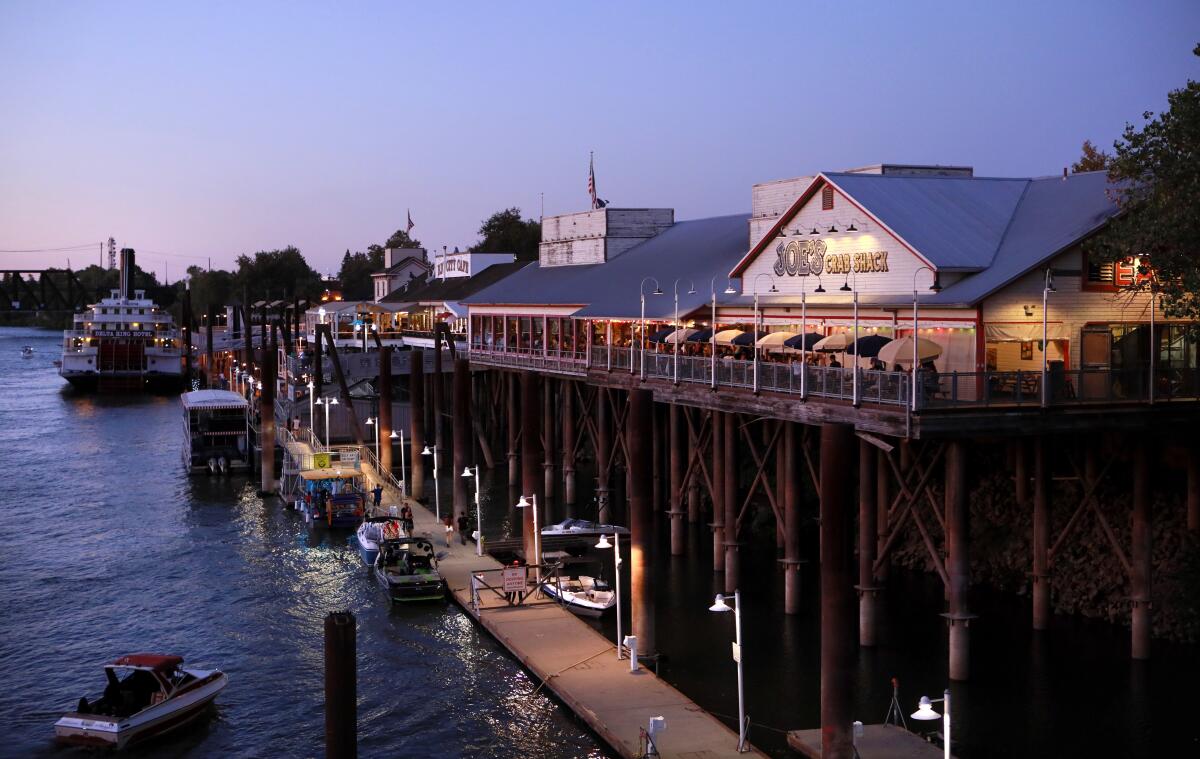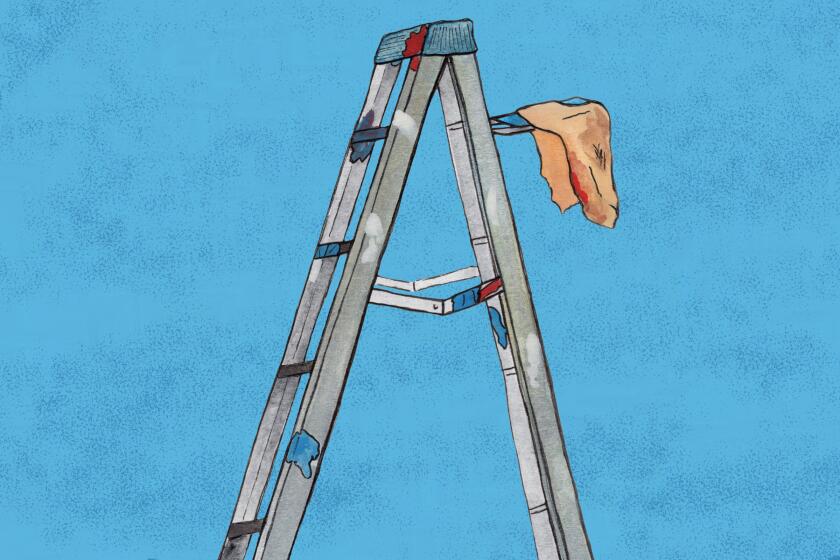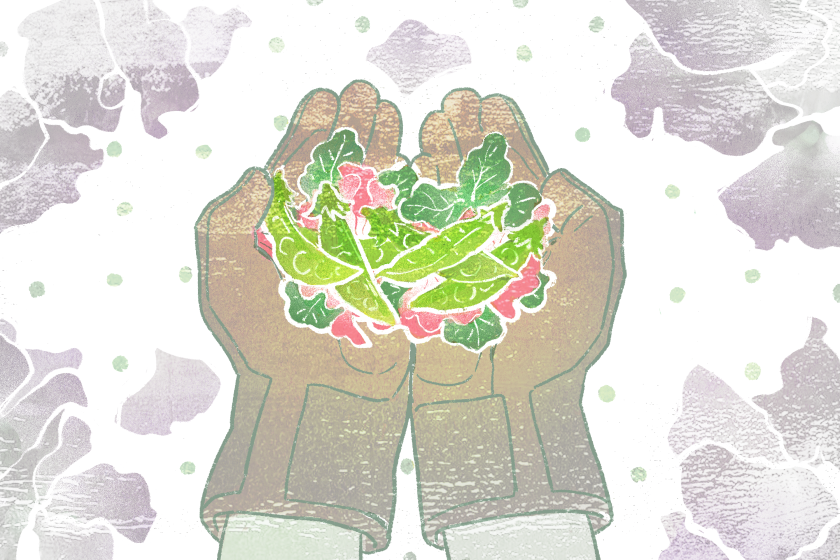Opinion: I miss my dad on Father’s Day, but California’s rains helped wash my pain away

- Share via
In March, my family reunited for a weekend in Sacramento, where I grew up, to celebrate my mother’s 80th birthday. The city had turned green after a period of torrential rain and storms. In the fields around the airport, buttercups and poppies bloomed. The native grasses, usually torched stiff by the unrelenting sun, were a lush emerald.
I knew climate change caused this verdant hallelujah, and yet, I was enraptured. As I drove in my mother’s car along I-80, an unfamiliar feeling stirred in me — affection for a landscape that I’d long found bleak, especially after I’d lost my father here years ago. Seeing Sacramento anew made me see my memories of this place through fresh eyes, and, unexpectedly, I felt connected again to my father.
Until I was 18, I lived on the edge of the city, near the foothills of the Sierra, in a suburb that at the time slanted politically right while my parents slanted left, where most mothers stayed home while my mother worked. Families in our neighborhood, built on the remnants of orange orchards, had second houses on Lake Tahoe.
He taught me that a father’s life isn’t measured by achievements but by the lives he inspires by being a dad.
My family saved its money for trips to the remote islands of Vanuatu in the Pacific, France and Ireland, voyages organized by my father. A history aficionado, he rose every morning at 5 a.m. to read before my brother and I woke up. He was decades older than the other dads, an Irish-Catholic civil servant, and a devoted Democrat. The antithesis of California cool, he wore suit pants with tropical shirts and tennis shoes. When he wasn’t in his office in the state Capitol, he was with my brother and me. He took us on excursions to Gold Rush towns, bribed us with doughnuts to watch World War II newsreels at the local airbase, and pulled the car over whenever we passed a historic plaque.
Like him, probably because of him, my imagination favored the past. Summer afternoons, I dressed in an ankle-long skirt, slung a fake rifle over my shoulder, and headed into the backyard to hunt for dinner or navigate a raft over the treacherous waters of the swimming pool.
As I grew, so did Sacramento. The suburbs bulldozed their way past our house, felling the oak trees, cluttering the foothills with strip malls, car dealerships and lookalike housing developments. This grieved my father, and it grieved me too. I remember a conversation in a restaurant near Truckee on a day trip to see the snow. “Soon enough,” my father said, “it’ll be one town from here to L.A.”
Although he was 57 and I was 16, we shared the same nostalgia. This was also the year that my father’s health started to fail, months of strange physical symptoms and medical tests that showed nothing. I dreamed about his death over and over, and then it came. On his birthday, I drove over the hill to our house and saw an ambulance on the curb, my father on the lawn, ringed by paramedics. His heart had stopped. Over the next two years, my sadness over Sacramento became an ominous cloud. I left for college without looking back, and whenever I visited — alone, and later with my own family — I felt the ache of heartbreak.
But this year, at 50 years old, I found myself in some gorgeous apocalyptic bloom, full of tenderness for everything I saw. Life blazed between the gas stations and driveways — the oleanders bursting, palm trees cutting into a brilliant, smog-free sky. From my mother and stepfather’s deck, the American River, usually a trickle on my visits home, rolled hard and wide and deep. A week before, the redwoods along the side of the deck had been cut down after dangerous winds almost toppled them onto the house, and the view was surprisingly clear. I love it here, I thought, watching turkey buzzards circle in the sky, then wondered why.
California’s ominous winter proved the planet is in terrible flux. To save what we can, head for the garden.
In over three decades, I hadn’t once experienced this sense of being home. It was as if after all those years of drought, the rain had washed my pain away. Transforming grief doesn’t happen overnight; and I still miss my dad every Father’s Day. But this year’s blooms created an opening for me to embrace him — and Sacramento — again after locking so much of that happiness away.
For my mother’s birthday party, our family gathered in Old Sacramento for a river cruise. Walking to the boat with my daughters, past 19th-century storefronts, I was 10 years old again, time-traveling to a past of tule hut villages, miners panning in streams, bonneted women driving covered wagons.
The smell of creosote as we crossed the train tracks filled my throat, then came the sultry smell of the river. The water’s surface, stirred by the rain, was brown and thick as a mud bank. We headed out in the boat, the speed whipping up a breeze. A herd of sea lions passed by. Sister Sledge belted out “We Are Family” from a speaker and my daughters beckoned me to dance. Joining them, I imagined my father on a bench, a book in his lap, watching us. That girl he raised was still in me, I thought, still able to bring back what was gone.
Jane Delury is a professor at The University of Baltimore and author of the recent novel “Hedge.”
More to Read
A cure for the common opinion
Get thought-provoking perspectives with our weekly newsletter.
You may occasionally receive promotional content from the Los Angeles Times.












